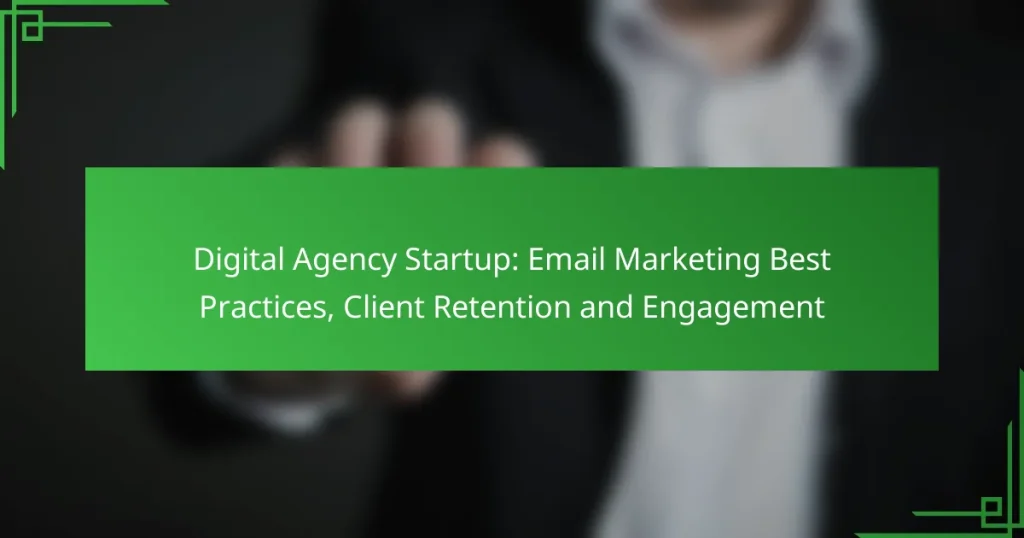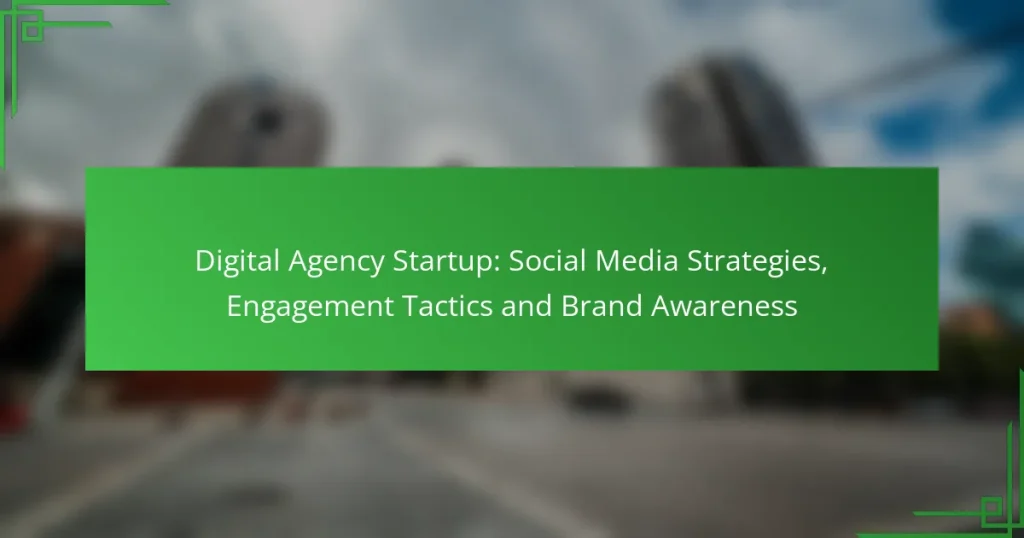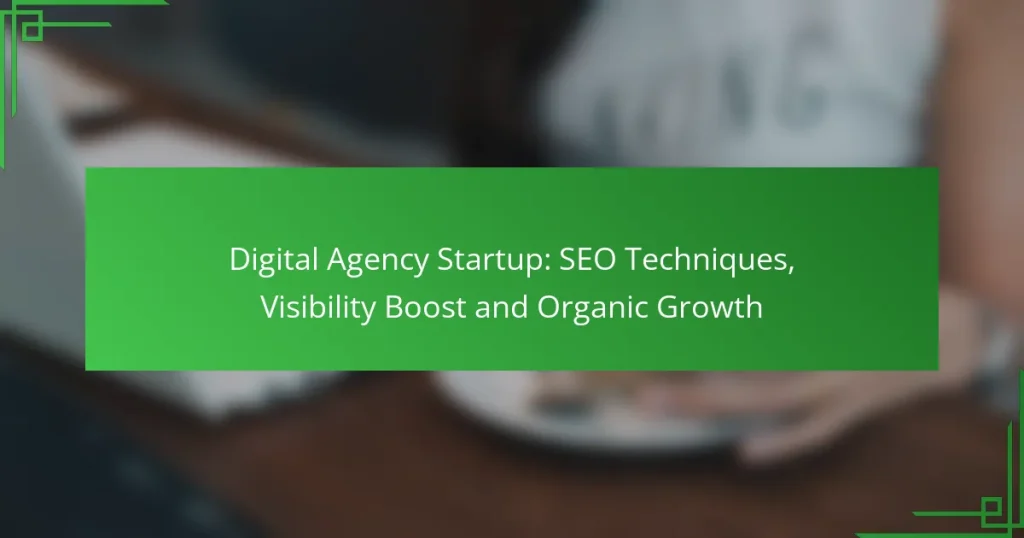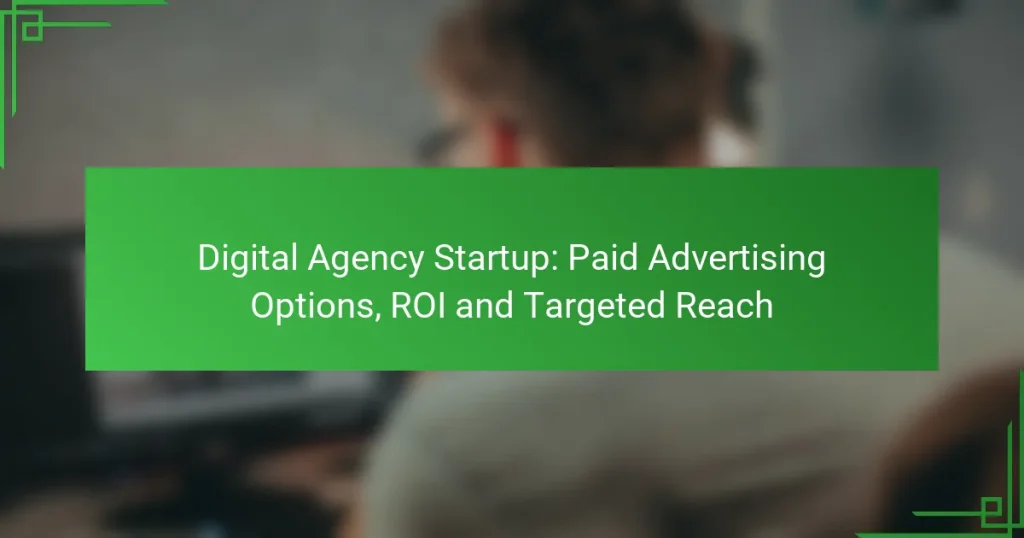Starting a digital agency requires a solid understanding of effective marketing strategies to thrive in a competitive landscape. By leveraging content marketing, social media, and SEO, agencies can enhance brand visibility and attract clients. Tracking key performance metrics is essential for measuring success and refining approaches to ensure continued growth.
Digital Agency Startup: Email Marketing Best Practices, Client Retention and Engagement
Digital Agency Startup: Social Media Strategies, Engagement Tactics and Brand Awareness
Digital Agency Startup: SEO Techniques, Visibility Boost and Organic Growth
Digital Agency Startup: Networking Strategies, Market Positioning and Relationship Building
Digital Agency Startup: Content Marketing Tactics, Client Attraction and Brand Positioning
Digital Agency Startup: Paid Advertising Options, ROI and Targeted Reach
What Are the Most Effective Marketing Strategies for Digital Agencies?
The most effective marketing strategies for digital agencies include content marketing, social media advertising, email campaigns, search engine optimization, and PPC advertising. Each strategy plays a crucial role in building brand awareness, attracting clients, and driving conversions.
Content Marketing
Content marketing involves creating and distributing valuable content to attract and engage a target audience. This can include blog posts, videos, infographics, and case studies that showcase your agency’s expertise.
To be effective, focus on quality over quantity. Aim for content that addresses common pain points or questions your potential clients may have. Regularly updating your content can also improve your agency’s visibility and credibility.
Social Media Advertising
Social media advertising allows digital agencies to reach specific demographics through targeted ads on platforms like Facebook, Instagram, and LinkedIn. This strategy can be highly effective for generating leads and increasing brand awareness.
Consider allocating a budget for paid promotions and experimenting with different ad formats, such as carousel ads or video ads. Monitor engagement metrics to refine your approach and maximize return on investment.
Email Campaigns
Email campaigns are a direct way to communicate with potential and existing clients. By sending newsletters, promotional offers, or personalized content, agencies can nurture leads and maintain client relationships.
Segment your email list to tailor messages to different audience groups. Use compelling subject lines and clear calls to action to increase open and click-through rates. Regularly analyze campaign performance to improve future efforts.
Search Engine Optimization
Search engine optimization (SEO) enhances your agency’s visibility in search engine results. By optimizing your website and content for relevant keywords, you can attract organic traffic and increase your chances of converting visitors into clients.
Focus on both on-page and off-page SEO strategies. This includes optimizing meta tags, improving site speed, and building backlinks from reputable sources. Regularly updating your content can also help maintain your search rankings.
PPC Advertising
PPC (pay-per-click) advertising allows agencies to display ads on search engines and pay only when users click on them. This strategy can deliver immediate traffic and is particularly useful for promoting specific services or offers.
Set clear goals for your PPC campaigns, such as lead generation or brand awareness. Utilize tools like Google Ads to track performance and adjust bids based on keyword effectiveness. Be mindful of your budget to avoid overspending while maximizing visibility.
How Can Digital Agencies Leverage Social Media?
Digital agencies can effectively leverage social media by creating a strong online presence, engaging with their audience, and utilizing targeted advertising. By selecting the right platforms and crafting tailored content, agencies can enhance brand visibility and attract potential clients.
Platform Selection
Choosing the right social media platforms is crucial for digital agencies. Consider where your target audience spends their time; platforms like LinkedIn are ideal for B2B services, while Instagram and TikTok cater to B2C interactions. Focus on 2-3 platforms to maintain quality engagement rather than spreading resources too thin.
Evaluate each platform’s unique features and demographics. For instance, Facebook offers extensive advertising tools, while Twitter excels in real-time communication. Tailor your strategy to fit the strengths of each selected platform.
Content Types
Content variety is key to keeping your audience engaged on social media. Use a mix of formats such as images, videos, infographics, and blog links to cater to different preferences. For example, short videos can showcase your agency’s work, while infographics can simplify complex information.
Consider creating educational content that positions your agency as an industry expert. Webinars, how-to guides, and case studies can attract attention and encourage sharing, further expanding your reach.
Engagement Tactics
Engagement tactics are essential for building a community around your agency. Respond promptly to comments and messages to foster relationships and show that you value your audience’s input. Regularly ask questions or create polls to encourage interaction.
Utilize user-generated content by encouraging clients to share their experiences with your services. This not only provides social proof but also enhances authenticity. Additionally, consider running contests or giveaways to boost engagement and attract new followers.
What Metrics Should Digital Agencies Track?
Digital agencies should track key metrics that reflect their performance and client success. Focusing on conversion rates, website traffic, and social media engagement provides a comprehensive view of effectiveness and areas for improvement.
Conversion Rates
Conversion rates measure the percentage of visitors who complete a desired action, such as signing up for a newsletter or making a purchase. A strong conversion rate typically ranges from 2% to 5%, but this can vary by industry. Understanding what drives conversions can help agencies refine their strategies.
To improve conversion rates, agencies should conduct A/B testing on landing pages, optimize call-to-action buttons, and ensure a seamless user experience. Avoid common pitfalls like cluttered designs or unclear messaging, which can deter potential customers.
Website Traffic
Website traffic indicates the number of visitors to a site and is crucial for assessing overall reach. Agencies should monitor both organic and paid traffic sources to understand where their visitors are coming from. A healthy website may see thousands of visits monthly, depending on the niche.
To boost website traffic, agencies can implement SEO best practices, create engaging content, and utilize pay-per-click advertising. Regularly analyzing traffic patterns helps identify successful campaigns and areas needing adjustment.
Social Media Engagement
Social media engagement reflects how users interact with content on platforms like Facebook, Instagram, and LinkedIn. High engagement rates, typically measured through likes, shares, and comments, indicate effective content that resonates with the audience. Aim for engagement rates of 1% to 5% as a benchmark.
To enhance social media engagement, agencies should post consistently, use eye-catching visuals, and engage with followers through comments and messages. Avoid over-promotional content, as it can lead to decreased interaction and follower fatigue.
What Are the Prerequisites for Starting a Digital Agency?
To start a digital agency, you need a solid foundation in digital marketing, a clear business model, and a portfolio showcasing your skills. Additionally, understanding your target market and having access to necessary tools and resources are crucial for success.
Business Plan Development
Creating a business plan is essential for outlining your agency’s goals, services, and operational structure. This document should detail your value proposition, target audience, pricing strategy, and financial projections. A well-structured plan can also help secure funding if needed.
Consider including sections on marketing strategies and competitive analysis. This will help you identify potential challenges and opportunities in the market. Regularly revising your business plan as your agency grows can keep you aligned with your objectives.
Market Research
Conducting thorough market research is vital for understanding your potential clients and competitors. This process involves analyzing industry trends, identifying target demographics, and assessing the competitive landscape. Utilize surveys, interviews, and online tools to gather insights.
Focus on identifying gaps in the market where your agency can provide unique value. For instance, if you notice a lack of specialized services in a particular niche, you can tailor your offerings to meet that demand. Regularly updating your research will help you stay relevant and adapt to changing market conditions.
How Do Digital Agencies Differentiate Themselves?
Digital agencies differentiate themselves by offering unique services, specialized expertise, and tailored solutions that meet specific client needs. This differentiation often revolves around their unique selling propositions, client testimonials, and the overall value they provide compared to competitors.
Unique Selling Proposition
A unique selling proposition (USP) is a clear statement that describes how a digital agency’s services are distinct from others in the market. It should highlight specific benefits that resonate with target clients, such as innovative technology, niche expertise, or exceptional customer service.
To create an effective USP, agencies should focus on their strengths and the unique challenges they solve for clients. For example, an agency specializing in e-commerce might emphasize its ability to increase online sales through data-driven strategies and personalized marketing campaigns.
Client Testimonials
Client testimonials serve as powerful endorsements that can significantly enhance a digital agency’s credibility. Positive feedback from previous clients can showcase the agency’s effectiveness and build trust with potential customers.
To leverage testimonials effectively, agencies should collect and display them prominently on their websites and marketing materials. Including specific results, such as percentage increases in traffic or sales, can make these testimonials more impactful. Additionally, video testimonials can add a personal touch and further engage prospective clients.






